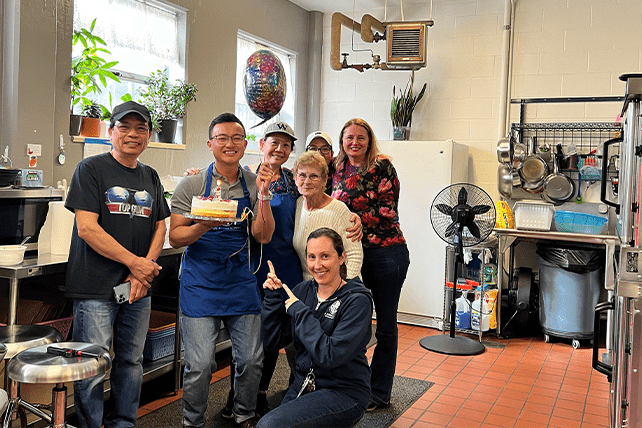There, he had a similar thought. “If I win first place, I’m going to do it.”
Spoiler: He won.
“You just saw a huge smile on my face. I was like, OK, tomorrow I’m going to reach out to a Jesuit and start the process,” he said.
Since September, he’s been sharing a discernment house the Jesuits have set up in Seattle, along with two other men who are also exploring a call to the priesthood.
“We’re kind of creating this as we go along,” said Nguyen.
The three young men meet regularly with their house supervisor and vocation director. Nguyen has a patchwork of volunteer jobs, including coaching basketball and helping out in a theology class at a local parochial school as well as serving lunch in its cafeteria.
“It’s almost like a postulancy program, without being formal,” said the Rev. Radmar Jao, who heads the vocation team for the Western province of the Jesuits and is himself a former actor. In addition to the volunteer work, he said, men are also connected to a local Jesuit community. According to the data compiled by the Jesuits’ West province, about 50 men are in an active discernment period and are further along in the process, including Nguyen and his two housemates.
Some of the men interested in joining the Jesuits are drawn to the idea of community. But the reality of communal life is complicated, said Jao.
“Community has its challenges. You got to be ready (to live with) someone with whom you don’t get along. Or they may come to us and realize, this is not the community I would like to live in.”
As in any other community, Nguyen and his fellow aspiring priests, who come from different cultural backgrounds, have encountered some bumps along the way. One minor conflict involved a disagreement over whether they should use the dishwasher or a drying rack (his vote), a conflict Nguyen termed “the battle of the Grandmas.”
Meanwhile, they are building a chapel in a room in the house, creating a space for future men in the discernment process “and finding a way to serve each other through our annoyances.”
Though there are fewer men’s communities than women’s, there are still over 200 men’s religious institutes in the United States, according to Sister Debbie Borneman of the National Religious Vocation Conference. Some men’s communities include priests and brothers, while others are only for brothers. “Among the men who entered religious life in 2022, nine in 10 (89%) expect to become priests, and one in ten (11%) plan to become a perpetually professed brother,” wrote Borneman in an email, citing CARA research.

